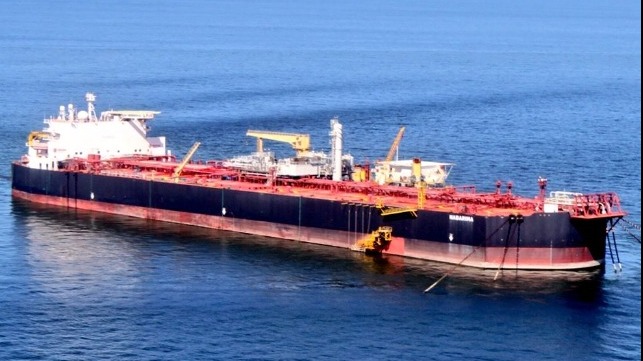Oil Unloading Operation Under Way for Stricken FSO Nabarima

Venezuelan state oil company PDVSA has started to transfer crude oil off of the stricken floating storage and offloading vessel (FSO) Nabarima, which is permanently moored in the Gulf of Paria, the semi-enclosed body of water between Trinidad and Venezuela.
On Wednesday, AIS tracking provided by Pole Star MDA showed the Nabarima attended by two Venezuelan-flagged vessels, the OSV Seabulk St. Frances and the tug Mare. The Panama-flagged tanker Icaro was anchored nearby. According to Reuters, the offload plan calls for transferring crude from the Nabarima onto a barge, then shuttling the barge over to the Icaro - a nonstandard ship-to-ship transfer arrangement. The process is expected to take several weeks, sources told Reuters.
The Nabarima's situation gained public attention in August when a Venezuelan offshore workers' union reported that the vessel had developed a heavy list. Eudis Girot, the head of the Unitary Federation of Petroleum Workers of Venezuela (FUTPV), released photos appearing to show flooding in machinery spaces aboard the Nabarima on August 30. Girot warned that she had about nine feet of water in some sections of her lower decks, and that she was laden with about 1.3 million barrels of crude oil. However, Italian oil major Eni - a partner with PDVSA in the Nabarima's operations - said that the vessel had been stabilized and posed no significant environmental risk.

that matters most
Get the latest maritime news delivered to your inbox daily.
Drone footage released by the Trinidadian NGO Fishermen and Friends of the Sea (FFOS) appeared to show the vessel listing approximately eight degrees to starboard and trimmed by the head. Gary Aboud, the organization's leader, said in a statement that the organization's photos were taken on October 17.
In late October, a three-person inspection team dispatched by the government of Trinidad and Tobago visited the Nabarima, and they reported that the vessel was back on an even keel and in stable condition. Trinidadian energy minister Franklin Khan told local media that PDVSA was beginning unloading operations and that maintenance and repairs on the Nabarima's "pumps and electrical motors" were under way.
